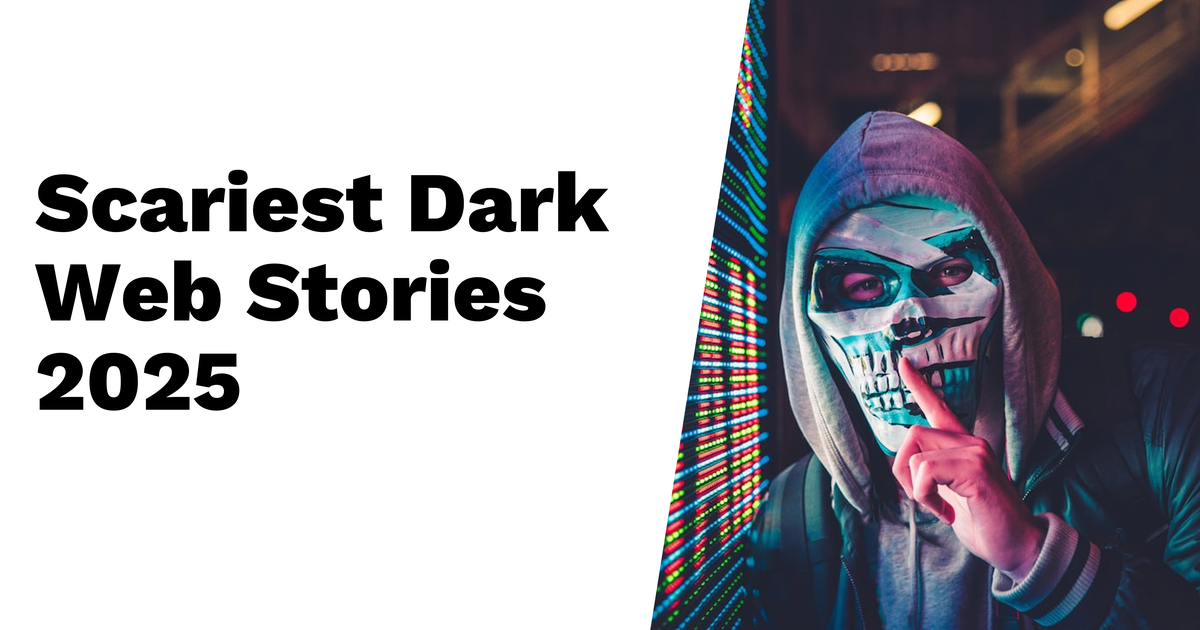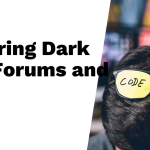The dark web is a realm filled with sinister tales that many prefer not to think about. Red Rooms, often considered urban legends, have been found to exist, where individuals pay for live acts of horror. Then there’s the disturbing trend of hitman-for-hire services; while most are scams, some plots got dangerously real and were intercepted by authorities. Cannibalism forums showcase chilling cases like the Cannibal Café incident, exposing grim subcultures online. On top of that, human trafficking remains a harrowing issue. As technology grows more complex, blackmail scams and cyberattacks threaten countless lives, demonstrating that the darkness lurking in our digital world is no mere fantasy.
Table of Contents
- The Reality of Red Rooms
- Hitman-for-Hire Services
- The Cannibal Café Incident
- Human Trafficking Operations
- Cicada 3301: The Unsolved Mystery
- Live Suicide Forums
- Data Breaches and Their Dark Web Aftermath
- Cyberattacks on Major Corporations
- Dark Web Forums and Their Illegal Activities
- Blackmail Scams
- The Rise of Digital Vigilantes
- Frequently Asked Questions
1. The Reality of Red Rooms

Red Rooms are often described as the most disturbing corners of the dark web, where users are said to pay to watch live acts of torture and murder. Accessing these rooms often requires navigating through layers of security and obscure links, suggesting a level of exclusivity that feeds into their dark allure. Despite many dismissing these tales as mere urban legends, investigations have turned up unsettling evidence indicating that some Red Rooms may indeed exist, raising grave concerns about the lengths to which individuals will go for a thrill.
The psychological effects of viewing such content are alarming, with studies suggesting that exposure to extreme violence can lead to desensitization among viewers. This raises ethical questions regarding the responsibility of platforms, even those operating in the shadows of the internet, to monitor and control the content they host. Law enforcement agencies are aware of these disturbing activities and are actively monitoring them, yet tracking down the perpetrators remains an arduous task.
Forums dedicated to discussing the existence and mythology of Red Rooms thrive in the dark web community, further fueling public fascination. Survivors of violent crimes have bravely shared their stories, illustrating how the consumption of such dark content can inspire real-life horrors. Ultimately, the concept of Red Rooms reflects deeper societal issues related to violence, morality, and the complexities of the human psyche.
| Aspect | Details |
|---|---|
| Summary | Red Rooms are infamous on the dark web, where users purportedly pay to witness live torture and murder. While many believed these to be myths, some investigations revealed actual sites, creating chilling concerns about the dark web’s capabilities for real-life horrors. |
| Source | [Vocal Media](https://vocal.media/horror/dark-web-nightmares-terrifying-true-stories-from-the-internet-s-underworld) |
2. Hitman-for-Hire Services
The dark web is notorious for hitman-for-hire services, which often promise to fulfill the darkest desires of those willing to pay. However, many of these offers are scams, designed to exploit vulnerable individuals seeking revenge or resolution to personal grievances. Cases have emerged where individuals tried to enlist a hitman, only to find themselves caught in an FBI sting operation. A notable example involved a man who wanted to kill his ex-girlfriend, leading to swift law enforcement intervention. These supposed services can demand large sums of money, yet there is little assurance that the contracts will be executed. Discussions on dark web forums often reveal the motivations behind hiring a hitman, typically rooted in deep-seated anger or a thirst for vengeance. Users are frequently cautioned about the risks involved, as the legal repercussions of attempting to engage with such services can be severe. The presence of these forums raises alarming questions about how easily individuals can access extreme and illegal options online. Many hitman scams employ fake testimonials and fabricated success stories to lure in unsuspecting victims, preying on their desperation. This troubling trend reflects a growing normalization of violence within certain online communities, highlighting the psychological complexities of those who seek such dark solutions.
- Dark web forums often advertise hitman services, but many of these offers are scams designed to extort money from desperate individuals.
- Some cases have emerged where users attempted to contract murders, only to be caught by law enforcement after investigations.
- A notable instance involved a man who sought a hitman to kill his ex-girlfriend, which led to an FBI sting operation.
- These services might charge large sums of money, but there is little guarantee of actual execution of the contract.
- Discussions and reviews on these forums sometimes reveal the motivations behind hiring a hitman, often rooted in personal grievances.
- Users are often warned about the risks of engaging with such services, including potential legal repercussions.
- The existence of these forums raises questions about the ease with which individuals can access extreme, illegal services online.
- Hitman scams often involve fake testimonials and fabricated success stories to lure victims into a trap.
- The psychological profile of individuals seeking hitman services can be complex, often involving deep-seated anger or revenge fantasies.
- The proliferation of these services reflects a disturbing trend towards the normalization of violence in extreme online communities.
3. The Cannibal Café Incident

In one of the most shocking events associated with the dark web, a man found a willing participant for cannibalism through an online forum. This gruesome case unfolded when both the perpetrator and the victim allegedly consented to the act, raising unsettling questions about consent, murder, and mental health. Investigations revealed that the forum had become a disturbing gathering place for individuals sharing similar cannibalistic fantasies, showcasing the extreme subcultures that thrive in the shadows of the internet. The incident sparked significant legal debates, especially when it came to prosecuting crimes that stem from consensual agreements between adults. While the media frenzy surrounding the Cannibal Café incident fueled public fear and fascination, it also highlighted the complex psychological profiles of both the perpetrator and victim, intertwined with elements of trust and desperation. The ramifications of this case continue to echo in discussions about internet regulation, free speech, and the potential dangers posed by unregulated online communities. It serves as a chilling reminder of how the dark web can facilitate the most extreme human desires and actions.
4. Human Trafficking Operations
The dark web has become a shocking marketplace for human trafficking, where victims are often listed with detailed descriptions and photographs, as if they were mere products for sale. These listings can be disturbingly graphic, showcasing the desperation of individuals who have been exploited. Law enforcement faces a significant challenge in combating these operations due to the anonymity the dark web provides. Traffickers can communicate directly with buyers, making it difficult to trace their actions and dismantle their networks. Many victims are lured under false pretenses, which complicates rescue efforts. Investigations have uncovered that these trafficking operations can be highly organized, with networks operating across multiple countries, further complicating law enforcement’s ability to intervene. Survivor stories reveal the immense psychological toll of such experiences, often resulting in long-term trauma and mental health struggles. Awareness campaigns are essential to educate the public about this issue and the role the internet plays in perpetuating such crimes. There is an urgent need for international cooperation among law enforcement agencies to tackle the global nature of these trafficking rings, emphasizing the importance of comprehensive strategies to combat this crime.
5. Cicada 3301: The Unsolved Mystery
Cicada 3301 is an enigmatic group that first made waves online in 2012 by posting intricate puzzles that captivated many, from cryptographers to hackers. With each new puzzle, participants encounter a blend of advanced cryptography and steganography, often requiring collaboration among a growing community of solvers. This mysterious organization has sparked countless theories about its true purpose. Some believe it’s a recruitment tool for intelligence agencies, while others view it as a social experiment. Despite extensive efforts, the identity of Cicada 3301 and their ultimate goals remain elusive, which only deepens the intrigue surrounding them. Those who have engaged with the puzzles sometimes report receiving strange invitations to secret meetups, further fueling the legend. The allure of Cicada 3301 serves as a symbol of the human fascination with puzzles and the unknown in our increasingly digital world.
6. Live Suicide Forums
On the dark web, some forums exist specifically for individuals grappling with suicidal thoughts. These platforms often lack any moderation or support, creating a dangerous atmosphere for those who are already vulnerable. Tragically, there have been instances where users streamed their suicides live, shocking viewers and leaving lasting emotional scars. The anonymity offered by these forums can give a false sense of security, leading individuals to believe they can safely share their pain without seeking real help. Instead of finding support, many engage in harmful discussions that can encourage further self-destructive behavior. Mental health professionals and survivors have raised alarms about the urgent need for better online support systems to address these issues. While some countries have begun to introduce legislation aimed at combating harmful online content, enforcing these laws remains a significant challenge. The existence of these forums raises critical questions about the responsibility of internet platforms to protect their users. Thankfully, community-driven initiatives are emerging, seeking to create safer spaces for open discussions about mental health and offering much-needed support.
7. Data Breaches and Their Dark Web Aftermath
Data breaches have become alarmingly common, affecting millions of individuals and companies each year. Once hackers obtain personal information, it often ends up for sale on dark web forums, creating a thriving market for identity theft and fraud. High-profile breaches, like those involving companies such as MCNA and Duolingo, spark public outrage and demand for accountability, exposing the stark reality of online vulnerability. Cybercriminals continuously exploit system weaknesses, showcasing the relentless battle between hackers and security professionals. The aftermath of these breaches can leave victims facing long-term consequences, including financial loss and emotional distress. Organizations are increasingly investing in cybersecurity measures to protect their data, yet vulnerabilities still exist, making education on personal data protection more crucial than ever. The dark web acts as a marketplace where stolen information is traded freely, further complicating the efforts to secure individual privacy and safety.
8. Cyberattacks on Major Corporations
In 2025, the frequency and impact of cyberattacks on major corporations have reached alarming levels. High-profile incidents, such as those affecting MGM Resorts and Clorox, have exposed serious gaps in corporate cybersecurity. These attacks not only led to massive financial losses but also triggered public relations disasters and drawn-out recovery efforts. Cybercriminals are employing increasingly sophisticated techniques, making it hard for companies to detect breaches before they escalate. The fallout can be severe, often impacting stock prices and eroding investor confidence. As a result, organizations are feeling the pressure to enhance their cybersecurity strategies. Many are now implementing proactive measures, including comprehensive employee training and robust incident response plans. The interconnected nature of today’s technology means that a single breach can have widespread effects, reverberating across various sectors. Furthermore, the rise of cyber insurance reflects the growing acknowledgment of these risks, as businesses seek ways to mitigate the financial fallout from potential attacks. The need for collaboration between the private sector and government has never been more crucial, as both strive to strengthen defenses against these evolving threats.
9. Dark Web Forums and Their Illegal Activities
Dark web forums like XSS, Nulled.to, and BreachForums are notorious hubs for cybercriminals. They thrive on facilitating illegal activities, with discussions ranging from hacking techniques to the sale of stolen data and contraband. Users on these platforms often share tutorials and tools for committing cybercrimes, which contributes to a culture that glorifies illegal behavior. The anonymity that the dark web provides allows participants to engage in these activities without immediate fear of being caught. While law enforcement agencies do monitor these forums, they often struggle to keep pace with the rapid evolution of tactics used by criminals. Some sections of these forums are specifically dedicated to selling illegal drugs, weapons, and other contraband, which only furthers the reach of criminal enterprises. The presence of such malicious actors raises significant concerns about the safety and security of the broader internet. Many forum users operate under pseudonyms, complicating efforts to track them down and hold them accountable. The alarming activities on these forums highlight the challenges of governing the internet and underscore the urgent need for better regulation.
10. Blackmail Scams
Blackmail scams on the dark web are becoming increasingly common, and they prey on the vulnerabilities of individuals. In these scams, victims are often threatened with the release of sensitive or embarrassing information unless they pay a ransom. This can include anything from personal photos to private messages, making the stakes incredibly high for those targeted. Many victims find themselves in these situations after their personal data has been compromised through data breaches or social engineering tactics. The emotional toll can be severe, leading to anxiety and distress as individuals grapple with the fear of exposure.
What makes these scams particularly chilling is the anonymity that blackmailers enjoy. They typically utilize anonymous payment methods, complicating efforts to trace them. In some cases, individuals have reported being blackmailed with fake evidence, further complicating their situations and causing even greater stress. Victims are often advised against paying the ransom, as this can lead to more demands or threats, creating a never-ending cycle of fear and manipulation.
The rise of blackmail scams highlights significant issues around privacy and trust in the digital age. As personal information becomes commodified, the potential for exploitation grows. Law enforcement agencies are becoming more aware of these issues and are increasingly focused on tracking down those who operate in the shadows of the dark web. This ongoing battle underscores the importance of online safety education, equipping individuals with the knowledge needed to protect their privacy and avoid becoming targets.
11. The Rise of Digital Vigilantes
As online crime becomes more visible, some people have decided to take justice into their own hands. These digital vigilantes often operate in the shadows, using the dark web to expose those they believe have committed wrongdoings. One common tactic is doxxing, where they leak personal information about offenders to the public. Some groups focus specifically on fighting serious crimes like child exploitation and human trafficking, driven by a mix of justice and revenge. However, the line between right and wrong is often blurred. While their intentions may be noble, these vigilantes can face legal repercussions for their actions. Moreover, their campaigns sometimes unintentionally target innocent individuals, causing harm in the process. The rise of social media has made it easier for these vigilantes to mobilize support quickly, yet their actions raise ongoing ethical debates about justice in the digital age. The effectiveness of their efforts also calls into question the accountability of law enforcement in dealing with these pervasive online threats.
Frequently Asked Questions
What is the dark web and why is it scary?
The dark web is a part of the internet that isn’t indexed by regular search engines. It’s often associated with illegal activities and disturbing content, which can make it scary for many.
Are all dark web stories true, or are some made up?
While many dark web stories are based on real events, some are exaggerated or completely fictional. It’s important to be cautious about what you believe.
How do people access the dark web?
To access the dark web, people usually use special software like Tor, which helps them browse anonymously and reach sites that aren’t normally accessible.
Can I get in trouble for exploring the dark web?
Yes, exploring the dark web can be risky. While just browsing might not get you in trouble, stumbling upon illegal content could lead to serious issues.
What types of stories or content are found on the dark web?
The dark web has a wide range of content, from disturbing stories and illegal markets to forums discussing hacking and privacy issues. Many stories are unsettling and can be quite shocking.
TL;DR In 2025, the dark web remains a disturbing landscape filled with real horrors. Reports of Red Rooms, hitman-for-hire schemes, and the Cannibal Café incident highlight its chilling nature. Human trafficking and live suicide forums add to the grim reality, while data breaches and cyberattacks showcase vulnerabilities in our digital age. Dark web forums facilitate illegal activities and blackmail scams, while the rise of digital vigilantes presents a complex dynamic. Staying aware and securing personal information is crucial in navigating this hidden part of the internet.





